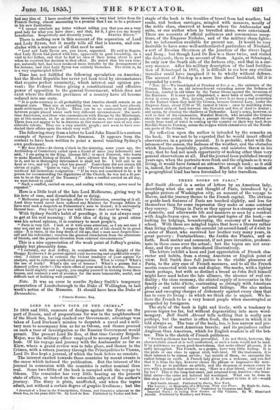LORD DE ROS'S TOUR IN THE CRIMEA. * IN 1834 and
1835, rumours of designs against the Porte on the Part of Russia, and of preparations for war in the neighbourhood of the Black Sea, having reached our Government, advantage was taken of Lord Durham's mission to despatch a naval and a mili- tary man to accompany him as far as Odessa, and thence proceed on such a tour of investigation as the Russian Government would permit. The present Lord De Ros, at that time Cavalry Brigade Major, was the military officer employed to accompany Lord Dur- ham. Of his voyage and journey with the Ambassador as far as Kiew, where a grand review was to take place, and thence to the Crimea, with a return journey through the Principalities to Vienna, Lord De Ros kept a journal, of which the book before us consists.
The interest excited towards those countries by recent events is the cause which induced the publication. But the interest of the journal in connexion with the countries is rather nominal than real. Some two-fifths of the book is occupied with the voyage to Odessa. The remainder has very little bearing on the present 'state of affairs, or indeed on the ostensible subject of the author's journey. The diary is plain, unaffected, and when the topics admit, not without a certain degree of graphic liveliness ; but the
• Journal of a Tour in the Principalities, Crimea, and Countries adjacent to the Black Sea, in the years 183.5-'36. Dy Lord de Roe. Published by Parker and Son.
staple of the book is the troubles of travel from bad weather, bad roads, and broken carriages, mingled with manners, mostly of the noble class, observed at houses where the Ambassador and suite, or our author when he travelled alone, were entertained. There are accounts of official politeness and ceremonious recep- tions, of the Emperor Nicholas, and of the military sham-fights; but no information available for present use. It would be very desirable to have some well-authenticated particulars of Nicolaief, a sort of Russian Sheerness at the junction of the rivers Ingul and Doug; but though Lord De Res was there twice, and visited the dockyards, there is no account of them. Again, at Sebastopol, he only saw the South side of the fortress city, and that in a cur- sory manner. After his military description of the land fortifica- tion of Sebastopol in 1835, it is difficult to see how any civilian traveller could have imagined it to be wholly without defence. The account of Perekop is a mere line about breakfast, till it is expanded by a note. " Nov. 2d.—We breakfasted at Perekop at fire a. ot., the entrance of the Crimea. There is an old intrenehment extending across the Isthmus of Perekop, erected in old times by the Tartar khans against the invasions of the Russians. It is now quite dilapidated, a mere bank of earth, crumbling down in every part. Nor, indeed, could it ever brave been a real protection to the Tartars when they held the Crimea, because General Lacy, under the Empress Anne, about 1736 or '37, turned it twice : once by marching down the narrow strip of land between the Sievatch and Sea of Azof to Arabat ; and again, by crossing the shallows at Tschondar. Laey'it army, however, as well as that of his commander, Marshal Munich, who invaded the Crimea about the same period, by forcing. a passage through Perekop, suffered se- verely from want of water in coming up the country on their way back from Batchki-Serai to Perekop, across the steppes which extend over all the North- ern parts of the Crimea."
No reflection upon the author is intended by the remarks on the book. It was not to be expected that he would insert officio./ observations in a private journal. It is probable, what with the lateness of the season, the badness of the weather and the obstacles which Russian hospitality, politeness, and ,mistakes threw in his way, that he had not much opportunity of making other than very general observations at all. Had the journal been published twenty years ago, when the portraits were fresh and the originals as it were living, it would have formed an attractive enough book; as it still is, indeed, for its picture of manners. Much of its information of a geographical kind has been forestalled by later travellers.


























 Previous page
Previous page